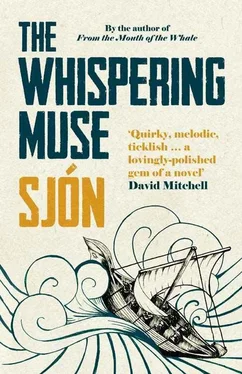‘We breathed through our mouths, hoping the miasma would disperse when we emerged from the close-packed houses. But when we drew near the palace and the stench proved even more pungent there and worst of all in the banqueting hall where the women awaited us, we realised that it originated in none other than the reed-soft bodies of the ladies we had come to meet. From innate courtesy both men and women pretended not to notice the stink. Doe-eyed Hypsipyle ordered her court ladies to form a line and Jason ordered his crew to do the same. Once this was done one of the maidens stepped forward and curtseyed and the crew member standing opposite her stepped up to join her and bowed, then she took his hand and led him to a seat in the hall, and so on down the line until there was no one left but Jason and Hypsipyle who bowed simultaneously, he lower still, and then walked hand in hand to the throne.
‘Great was the relief of both sexes when the stench evaporated the instant the hands of man and woman met. For with our arrival and willingness to touch such noxious-smelling women we had unwittingly broken the spell on our gentle hostesses. They told us that as a punishment for driving away their husbands, Aphrodite had put a spell on the women of Lemnos that they would give off such a putrid stench that no man would wish to come within three hundred paces of them. The reason for the spiteful nature of this curse was that Aphrodite’s husband, that clumsy cuckold Hephaestus, held sway on Lemnos and the women had always diligently tended his temple with sacrificial gifts and paeans. But Aphrodite envied her husband the attention and had long sought a means to harm the women. Yet now it transpired that in devising her vengeful gift the busy goddess of love and underhand dealings had forgotten that a long sea voyage renders all women equal in a sailor’s eyes…’
Here Caeneus broke off, raising his eyebrows to the roots of his hair and waiting for his shipmates’ reaction.
‘Yes, don’t we know it!’ piped up the first engineer.
And the crew of the MS Elizabet Jung-Olsen bubbled over with laughter. Whereas I, the purser’s lady friend and the purser himself (after being elbowed by his lady friend) lowered our eyes and waited for the mate to resume his tale, which he did after the men had got over their mirth:
‘At the banqueting tables, on the Argonauts’ first evening on the Island of Women, we were entertained with an epic from the lands north of the River Istrus. The poet was a slender, long-limbed woman who plucked a pearl-inlaid lyre in accompaniment to her song. Her corn-yellow hair was cut short, locks the length of a handspan rippling about her head like waves on a shore. About her shoulders she wore a black shawl that covered her arms down to the backs of her hands, where it was fastened to her middle fingers with silver rings. There were no pictures on this costume, but the poetess drew her song from its dark weave and the themes were all as sombre in colour as the night; the jests evoked a raven’s wing dipped in pitch, while the reality that underpinned them was bottomless as the pupil in a hate-filled eye.
‘Her poem told of the hapless hero Sigurd who slighted his wife, the sorceress Gudrun, by planning to take a new wife, the princess Brynhild. He told Gudrun that this would be in the best interests of their sons, Gjuki and Hogni. Sigurd made a pact with Brynhild’s father, King Grim, that Gudrun should be allowed to go into exile with a generous purse while their sons remained with him and Brynhild took their mother’s place. Naturally, his actions were motivated by consideration for the boys and had nothing to do with the young princess’s downy soft bosom or virginal rose-pink flesh. This arrangement was all the greater betrayal of Gudrun since she had cast off everything that is dearest — her father, homeland and younger brother — in order to follow Sigurd wherever the goddesses of fate led them.
‘The black-clad poetess began her song by describing how Sigurd and Gudrun fell in love when he raided the coast of her homeland, intending to carry off a swan’s-feather cloak of white silver that hung in the sacred grove of Freyja, guarded by the poisonous serpent Fafnir. There was no getting past this monster except by witchcraft — and no one knew this black art better than Gudrun, who at the time was both daughter to the king of the land and also a priestess of Hel.
‘In Sigurd’s retinue were three goddesses who travelled with him unseen. These were Frigg, Sif and Freyja, who vied among themselves as to who had the most power over the mortal man’s fate. Freyja caused one of her cats to scratch Gudrun, who was so consumed by the fires of love that she became unhealthily enamoured of Sigurd. That night the two of them stole to Freyja’s temple and the king’s daughter lulled the dragon to sleep while Sigurd drew his halberd and struck the monster a blow under the pinion as she had taught him. At that the hideous Fafnir started up and blasted out a terrible poison, but thanks to Gudrun’s intervention it did the hero no harm. From this deed Sigurd won the title of “Fafnir’s bane”. He now snatched up the feather cloak of glittering silver, which had the property of endowing whoever wore it with the gift of flight like a bird.
‘Gudrun was forced to flee with her lover, taking her brother Helgi with her, while King Gjuki gave chase with thirteen swift-sailing ships. To delay his pursuit, Gudrun killed Helgi, dismembered his body and threw it into the sea, so that their father Gjuki would have to pause in his voyage to gather up the remains of his son. In this manner the lovers, Sigurd Fafnir’s-bane and Gudrun Gjukadottir, made their escape.
‘At this point in the epic the daughters of Lemnos laughed cynically, and the poetess rested her long fingers on the strings of her lyre until their laughter had died away. Meanwhile, we men seized our cups and raised them to our lips to drown the nausea that rose in our throats.
‘How could their womanly hearts take pleasure in such a sickening tale?
‘By the time the nectar had soothed my throat the women’s laughter had ceased and I glanced at the maiden beside me. She was waiting, expressionless and still, for my response and when I managed to force my lips into a curve she smiled sweetly back, stroking my hip — before her eyes, wet with tears of mirth, flickered from mine to resettle obediently on the poetess who now resumed her strumming. The second half of the story was even uglier than the first.
‘It told of Sigurd’s homecoming.
‘After voyaging over strange and perilous seas he returned to his fatherland to exchange the silver-plumed treasure for the kingdom in accordance with the bargain he had struck with King Attila before he left. But Attila laughed at Sigurd and broke the pact, saying: “Take your stinking swanskin and spread it under Gudrun Gjukadottir next time you lie with her. Then you will know the colour of her blood — for black on white is easily seen!”
‘Thus King Attila insulted Sigurd Fafnir’s-bane, sitting tightly ensconced on the throne that the hero had intended for himself and his wife. And Sigurd had to endure the humiliation of being denied the kingdom in spite of having retrieved the priceless swanskin. The men who had sailed with him to the end of the world now turned their backs on him; the crowd who had welcomed Sigurd as their new king on his homecoming now whispered ever louder about the devilish arts employed by his foreign bride-to-be for the theft: indeed, what they had once called recovery they now termed plunder — and Sigurd’s men had no wish to be associated with a thief.
‘But Gudrun Gjukadottir did not stop there in her eagerness to help Sigurd Fafnir’s-bane. She became a regular guest at the palace where she enchanted Attila’s daughters, Gunnhild and Hildigunn, with her flattery and magic. In their youth and naiveté they were taken in by the foreign woman’s honeyed words — for she was both exotic and sinister in a way that titillates the young — and as is common with teenagers, the princesses despised their father as old and behind the times. He was ancient, nearly fifty! They were ashamed of him, and so were delighted when the beautiful enchantress said she knew a way to make King Attila young and virile again.
Читать дальше












